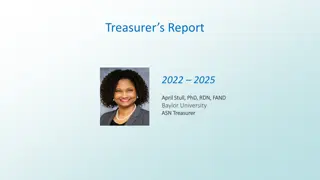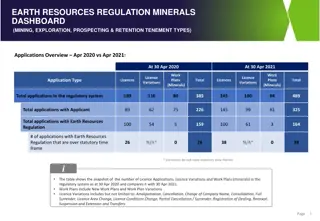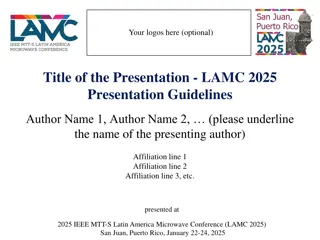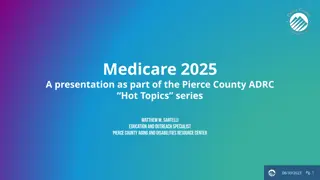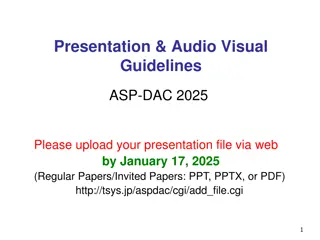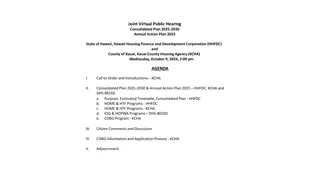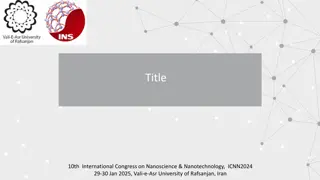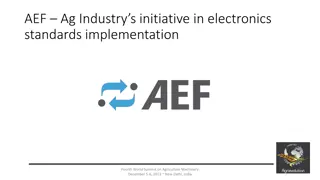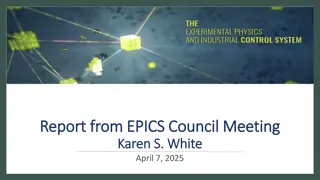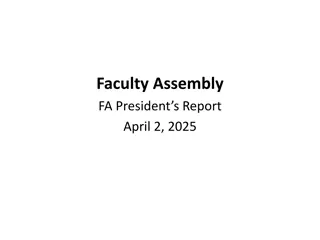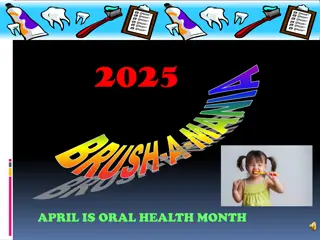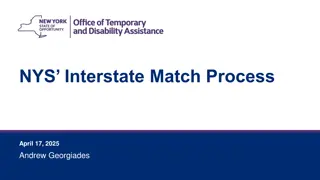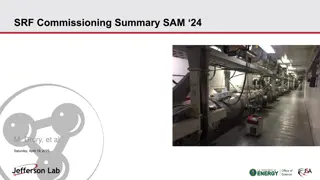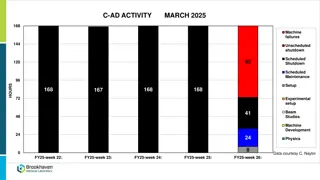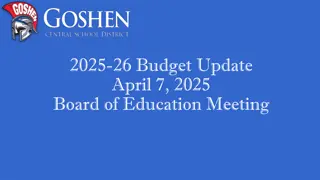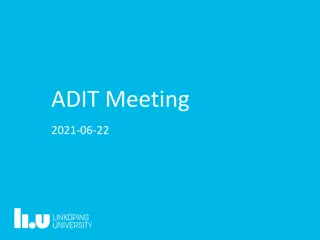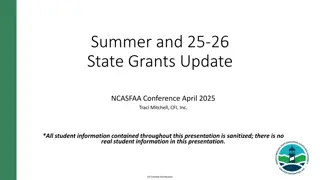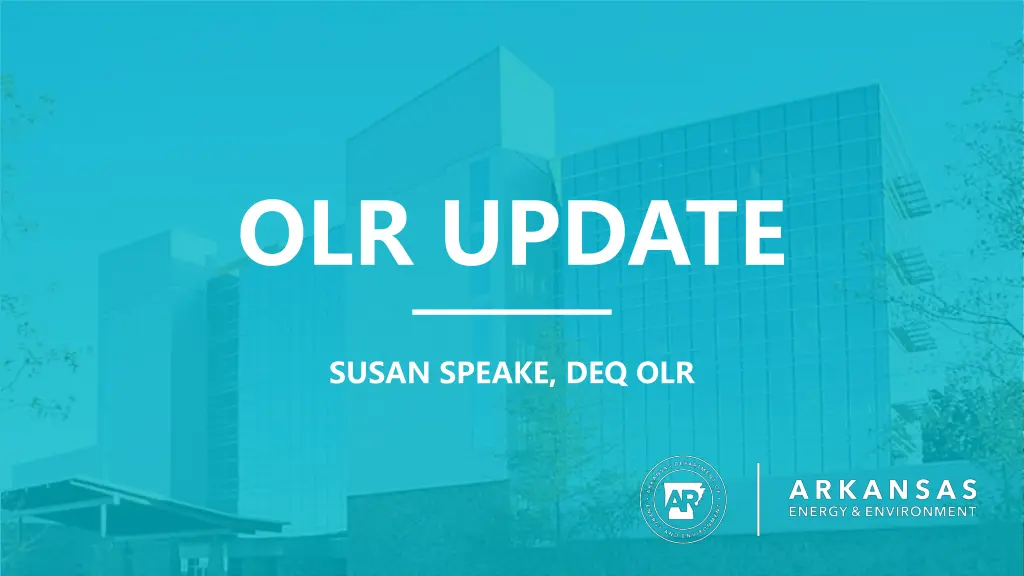
Environmental Legislation Process and Laws in Arkansas
Explore the legislative process and environmental laws in Arkansas, including the Freedom of Information Act, remedial actions for brownfield sites, and the SWIFR Program. Learn about the stages of state legislation and recent laws passed in the 2025 session impacting E&E work.
Download Presentation

Please find below an Image/Link to download the presentation.
The content on the website is provided AS IS for your information and personal use only. It may not be sold, licensed, or shared on other websites without obtaining consent from the author. If you encounter any issues during the download, it is possible that the publisher has removed the file from their server.
You are allowed to download the files provided on this website for personal or commercial use, subject to the condition that they are used lawfully. All files are the property of their respective owners.
The content on the website is provided AS IS for your information and personal use only. It may not be sold, licensed, or shared on other websites without obtaining consent from the author.
E N D
Presentation Transcript
OLR UPDATE SUSAN SPEAKE, DEQ OLR
AGENDA FOIA, LEGISLATIVE PROCESS, AND ENVIRONMENTAL LAWS Freedom of Information Act (FOIA), how a bill becomes a law, environmental laws passed during the 2025 legislative session. REMEDIAL ACTION AND BROWNFIELD Sites remediated through OLR s Brownfield Program, acres returned to use, importance of remedial action for ancillary sites. SWIFR PROGRAM Solid Waste Infrastructure for Recycling (SWIFR)
FOIA AND ENVIRONMENTAL LAWS
FREEDOM OF INFORMATION ACT (FOIA) WHAT IS IT? The Freedom of Information Act (FOIA) gives Arkansans access to public records and public meetings (with some exceptions). WHAT ARE THE EXCEPTIONS? Documents containing the personal information (DOB, SSN, Home Address, etc.) must be redacted before they can be provided. E&E FOIAS In 2024, DEQ Offices received: Office of Water Quality: 84 Office of Air Quality: 96 Office of Land Resources: 623
STATE LEGISLATION STAGES 01 02 03 04 INTRODUCTION OF BILL REFERRAL OF BILL FLOOR ACTION COMMITTEE ACTION A member of State Congress introduces a bill. It is assigned a number that indicates which chamber it originates from. (e.g. SB= Senate Bill, HB= House Bill) If the committee recommends passage, the bill is placed on the calendar for debate and voting on the floor of the House or Senate A vote is taken on the bill The bill is referred to a relevant committee. e.g. Energy Committee; Labor & Environment subcommittee; Public Health, Labor, Welfare Committee Committee and/or subcommittees study the bill, hold hearings, and may make amendments. Committee can vote to recommend bill for passage, defeat it, or make changes
STATE LEGISLATION STAGES 05 06 07 08 CONFERENCE COMMITTEE PASSAGE IN ONE CHAMBER GUBERNATORIAL ACTION FINAL PASSAGE Once both chambers pass the same version of the bill, it is sent to the Governor for action. If no action is taken within 10 days, the bill becomes a law. If the bill passes in one chamber, it is sent to other chamber for review and action. The bill is referred to a committee in the other chamber * Steps 2 & 3 are repeated if necessary The Governor can sign the bill into law, veto it, or take no action Congress can override a veto with a two-thirds vote in both chambers. If chambers pass different versions of the bill, a conference committee with members from both chambers is formed to reconcile differences
NEW LAWS We are nearing the end of the 2025 legislative session. Here are a few laws that were passed this session that impact our work at E&E: HB 1121 ACT 211 LAND TRANSFER Repealed the law concerning the transfer of tax-forfeited land to state institutions. HB1383 ACT 148 AMEND PSTTF Amend petroleum trust fund and modify the amount of the payment for corrective action. Increase from 1 million to 2 million. HB 1410 ACT 323 INSPECTION NOTICE No public employee will provide advance notice of an inspection to improperly influence the outcome of the inspection.
BROWNFIELD AND REMEDIATION
ARKANSAS BROWNFIELD LAW A Brownfield is a parcel of property where commercial, industrial, or agricultural use may have contaminated the site with a hazardous substance, complicating prospects for expansion, redevelopment, or reuse 1995 1996 1997 Arkansas Brownfield Law (Act 125) passes with bipartisan support Amendments adopted to expand property qualification, limit financial liability, and provide low-interest loan program for participants External and Internal work groups form to develop cleanup standards, guidance, and policy
01 ELIGIBILITY Individuals, companies, or developers who did not contribute to the contamination and who do not hold title to one of the abandoned properties 02 FINANCING SITES The purchaser will be able to define financial obligations early in the process and will not be held liable for past contamination after the cleanup is complete. 03 FINANCIAL ASSISTANCE DEQ provides Technical Assistance to nonprofit or public Brownfield Program Participants for environmental site assessments. Funds are also available through federal EPA grants.
BROWNFIELD PROGRAM GOALS Provide continued protection of human health and the environment Encourage redevelopment as a sound land-use management policy Develop Risk Based cleanup standards Enable prospective purchasers to determine liability up front Develop a schedule-oriented program that can keep pace with real estate transactions
FORMER BROWNFIELD SITES Renovation of the EC Crossett Youth Center in Crossett DEQ provided assessments Ongoing construction of the Sultana Disaster Museum in Marion, AR DEQ provided assessment and cleanup Once threatening to environmental and public health, these sites have been returned to the communities, thanks to the Brownfield Program! Renovation of the former Smith Hospital in Paris, AR DEQ provided cleanup
SWIFR GRANT FUNDING CAN BE USED FOR 3 CATEGORIES OF ACTIVITIES Develop or update plans to advance post- consumer materials management. Develop, strengthen, and/or implement comprehensive data collection efforts that demonstrate progress towards the National Recycling Goal and Food Loss and Waste Reduction Goal. Support the state-led implementation of plans.
STATEWIDE SOLID WASTE MANAGEMENT PLAN Act 1376 of 2001 Division of Environmental Quality has the responsibility of developing the Statewide Solid Waste Management Plan (SSWMP), which gives emphasis to regional planning. Regional Solid Waste Management Boards address the solid waste needs of the state within their geographical area. The development and implementation of a SSWMP is necessary to maximize the efficiency of regional solid waste management systems. The SSWMP establishes minimum requirements for all regional solid waste management plans, including requirements for: strategic planning; reporting; public notice and participation; services; and solutions to problems and issues.
STATEWIDE SOLID WASTE MANAGEMENT PLAN (CONT.) Six (6) major goal areas were established: Collection Disposal Recycling Waste Reduction Special Materials Education The development and implementation of a SSWMP is necessary to maximize the efficiency of regional solid waste management systems. First plan under this legislation was implemented in 2003. The most recent revision was 2014.
WHY UPDATE THE PLAN NOW? PLANNING AREAS HAVE CHANGED THE PLAN IS OUTDATED NEW CHALLENGES The SSWMP has not been updated since 2014. There were 16 Regional Solid Waste Management Districts when plan was first developed; now there are 19. Recycling struggles with new technologies, such as lithium-ion batteries, electronic waste, and solar panels.
PROGRESS & NEXT STEPS 01 02 03 04 SEND OUT SURVEY CONDUCT STAKEHOLDER MEETINGS THROUGHOUT THE STATE ANALYZE SURVEY RESULTS AND PUBLIC INPUT UPDATE THE SOLIDWASTE MANAGEMENT PLAN
What are some successful recycling opportunities you have seen or been a part of in Arkansas? SURVEY QUESTIONS What areas of the state do you believe lack recycling? How do you believe recycling and solid waste management can be improved? What are effective ways of educating others on how to recycle? What would engage you and those around you to recycle more at work or at home?
AREAS OF FOCUS BASED ON RESULTS 01 02 03 04 BENEFITS GOVT ACTION EDUCATION RURAL ACCESS Advertise! Increase access in rural areas Branch out on successes in curbside Make it easy! Legislative changes Economic Involve school districts Education programs Environmental What can/can t be Statewide campaigns Quality of life recycled Funding opportunities How to properly recycle
KEEP IN TOUCH ARKANSAS E&E 1501 Northshore Drive North Little Rock, AR, Zip 72118 PHONE t: 501.682.0594 EMAIL Susan.speake@arkansas.gov WEBSITE www.arkansas.gov/environment @ArkansasEE @AREnergyEnvironment


